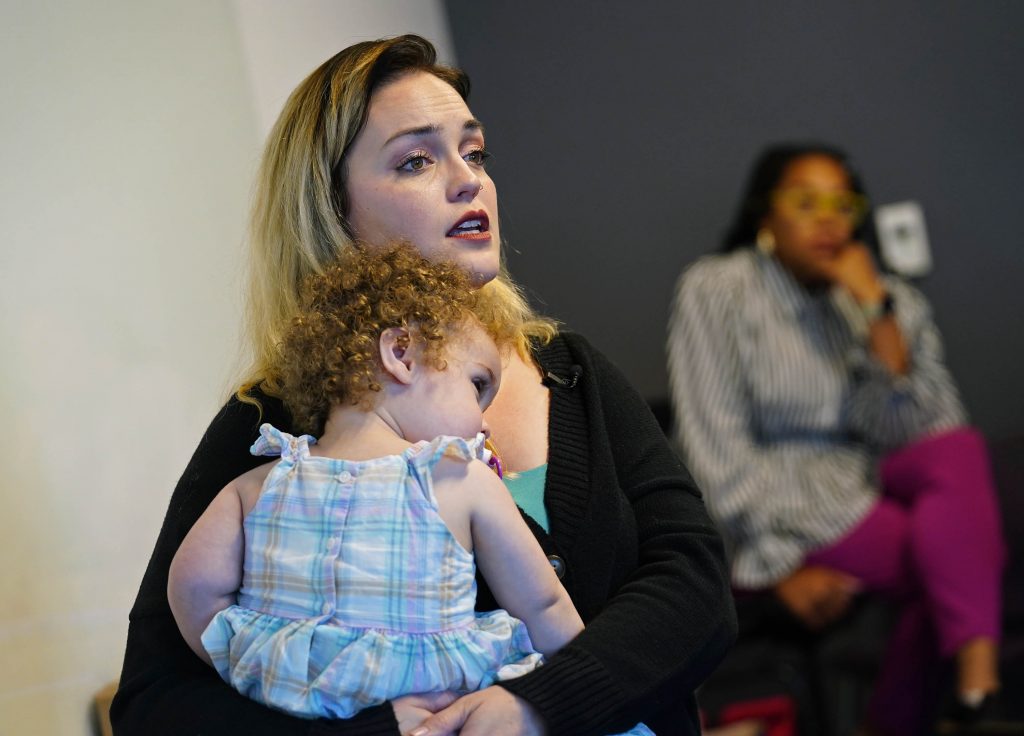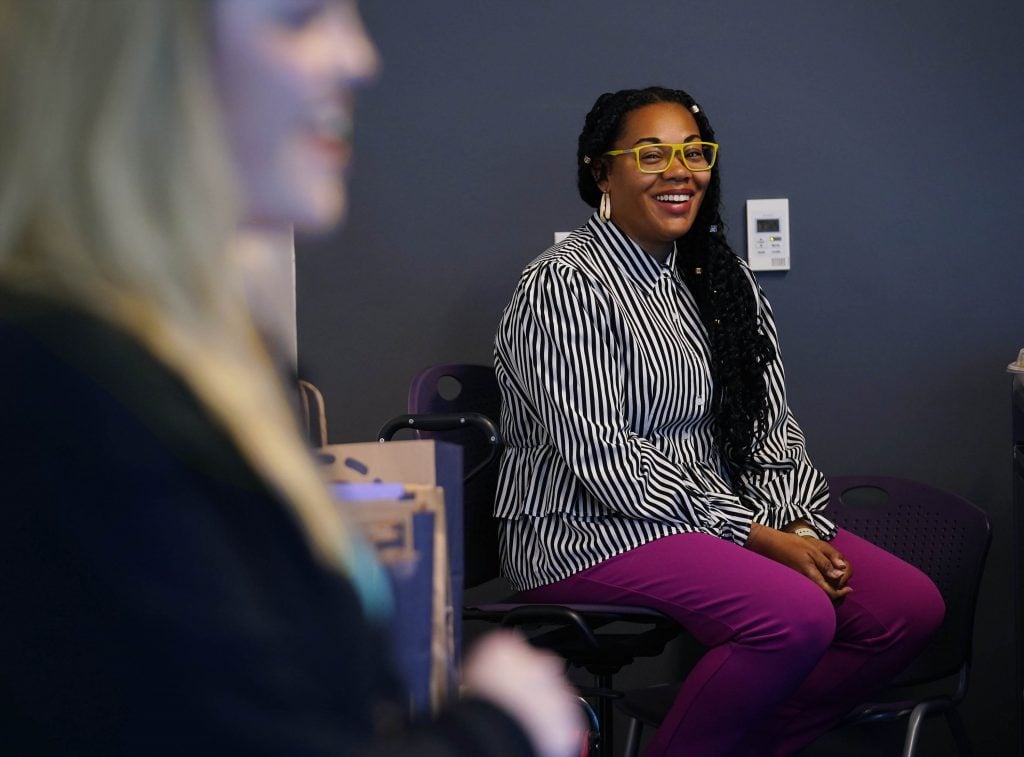
Photos by Ralph Freso
The guest speaker’s toddler was fussing. So 18-month-old Harper was brought up to rest her cheek on Dr. Danisha Keating’s shoulder, while she gently rocked her on her hip and kept talking.
It wasn’t the only mothering going on. Students who once were in foster care were celebrating the end of a year at Grand Canyon University on Monday and wanted to share with Keating, who had been through it herself.
“I’m only 19,” said one student, “but I feel like I’m 90.”
“Who all feels old in this room?” Keating asked the dozen others in GCU’s Fostering Futures program, which provides tuition and housing for those who have aged out of foster care.
More than half raised their hands.
“You are smart; I saw those eyes,” Keating told the student as she continued to rock her child. “You are hard working. You are in college.”
Keating, a speaker, author and teacher, has been in their shoes, and the title of her memoir, “From Foster to PhD: Letters from a Suitcase,” is an inspiration toward one way to walk, as she did, across the GCU Commencement stage in 2021 with her doctorate.
She’s not blind to the struggle. She taught herself to read at age 9 because her parents didn’t send her to school, struggled through high school after entering foster care, questioned herself though community college because people kept telling her to quit, and was sleeping in cars or hopping to 33 different addresses in the eight years that it took her to get a bachelor’s degree.

“Sometimes I feel burned out from my life,” she said, “a sorrow for what my life was.”
But this is what she did. She kept jumping into the fray, like the time she ran a marathon and didn’t exactly train.
She was scared at the start. “Then walk it,” a friend told her. She didn’t know that was even possible, to take it slow, but the people who finished long after the winners were gone looked even more happy. It became a motto, “Just walk it,” she said. “Stop pushing to the extreme.”
Brandi Turner, Fostering Futures student administrator, told students that Keating’s life was abundant with those inspirational “golden nuggets,” and “one was that every win was a big deal, so think about you sitting in this room today.”
Keating’s journey toward a doctoral degree in general psychology/cognition and instruction came after getting guardianship of five siblings, all packed tightly into the 500-square-foot apartment she finally got at age 24, while working several jobs. But those challenges led to where she is today. She has a child, Harper, and husband, Mark, a GCU graduate in Christian studies, a California home and a documentary team filming her in the classroom.

“Fifty percent of foster kids don’t graduate from high school, and only 3% of children in foster care earn a bachelor’s degree. I want to flip that script because we have always been told we can’t,” she said. “If you are sitting in a college classroom right now, you’ve already beat the high school statistics. It wasn’t easy, no one knows your story, no one knows what you’ve had to go through. But there’s a lot of things I’ve learned.”
- You are more important than a bad grade or a GPA. “So many times we are sitting in rooms where people are told to go be successful, and I just need to eat today. That’s a reality for a lot of people in foster care. My GPA in high school (1.7) didn’t determine where I am today.”
- Decide what to be, then go be it. Or if you don’t know, hold on to making rash choices for a second. “There was an art teacher there who changed the direction of my life. He asked me, ‘In 10 years from today, when you wake up, would you be happy with the choices you are making?’ I sat with that in class with that weird, firey-pit tingling.” Ten years later, she awoke thinking of that art teacher’s advice while raising five children and in a Ph.D. program: “I’m not happy with where I am at, but I’m happy with the choices I made.”
- Success is never a straight line. “A lot of people might look at Danisha today and go, ‘Wow, girl, you blew up overnight.’ They don’t see the last three years of getting rejected repeatedly, they don’t see 15 years of working on school, they don’t see the last 20 years of me working on my heart and mind to make sure I was ready for today. So when you think someone’s success is easy, step back and ask, ‘What are they doing when no one is looking.’”
- Building social and professional networks is important. Her story was ignored until she was advised to self-publish a book and now does nearly 50 speaking engagements a year. “Someone in my professional network said let me open this door, and in the last three years, there has been a floodgate that has happened of me being able to tell my story.”
- Mental health is vital. “Especially when you experience trauma, there is a lot that happens when you need to take a break,” she said. “Let’s go find a hiking trail or get Chipotle. There are so many times I stressed telling myself I’m not good enough, which was so much harder than saying, maybe I’m good enough today.”
- “There is only one you, and you are important. Your story can be whatever you want it to be. Your story may be being a hair stylist … which is as good as getting a Ph.D. Nobody can tell you your story.”
- “You will fail, you will fall, and you’ll get back up,” she said, using a boxing story as a metaphor of wildly swinging versus pausing to analyze a strategy. “Sometimes we swing, sometimes we hold back, and that is the biggest lesson I have learned, coming from where we come from, is that sometimes we have to learn how to wait.”
Grand Canyon University senior writer Mike Kilen can be reached at [email protected]
***
Related content:
GCU News: Nursing student shares her tragedy and grit with Fostering Futures recipients
GCU News: Foster care, homeless, dyslexic ... and a doctorate



































































